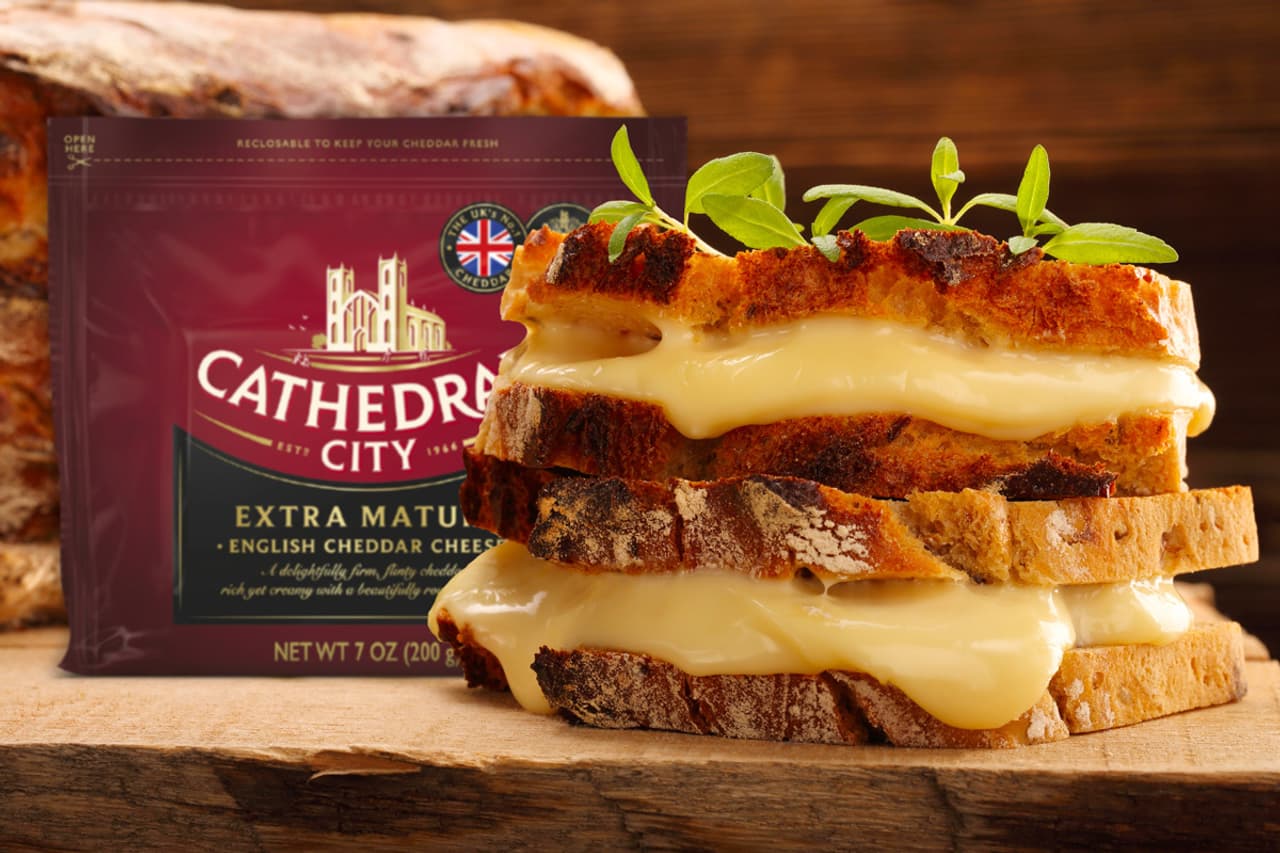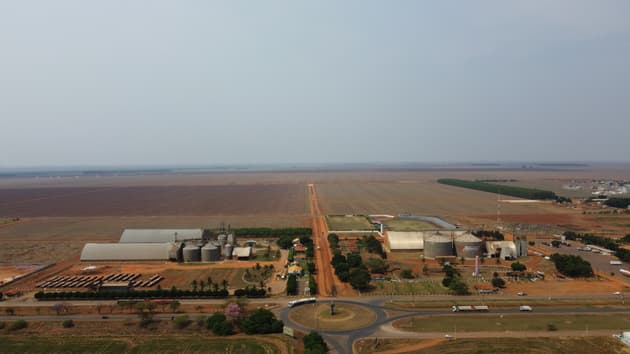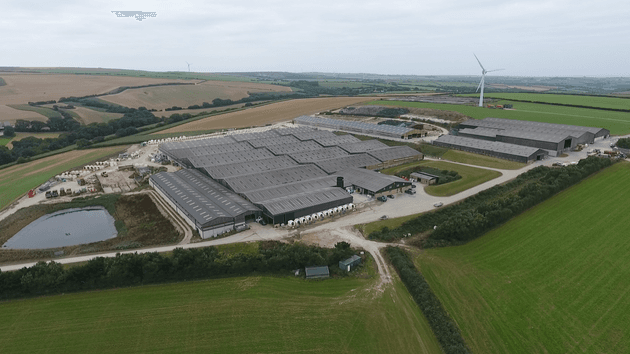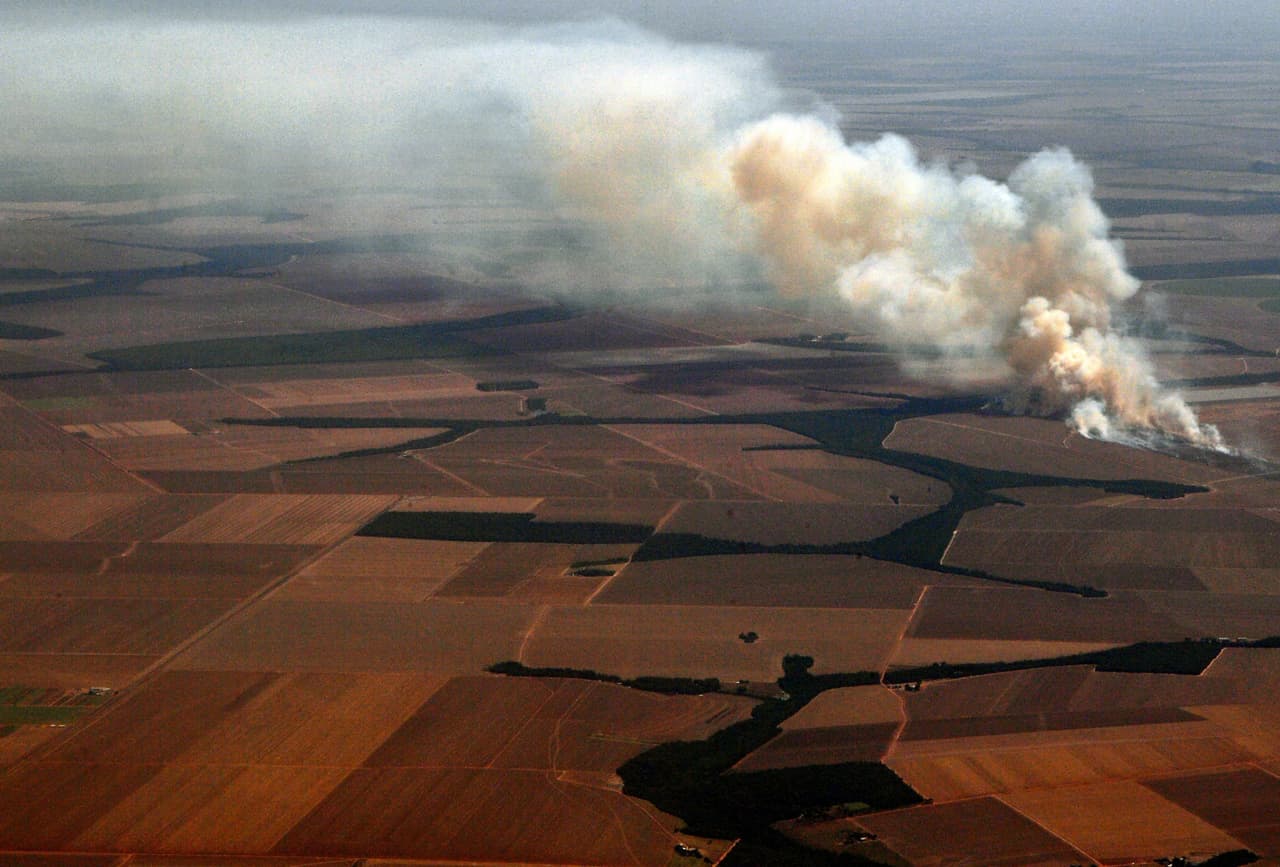
British supermarket cheese linked to catastrophic deforestation in Brazil
UK farms supplying milk and dairy products for Cathedral City Cheddar, Anchor butter and Cadbury chocolate are feeding their cattle soya from a controversial agribusiness accused of contributing to widespread deforestation in Brazil, an investigation has revealed.
The farms, which sell milk to Saputo, Arla and Cadbury, source some of their animal feed from companies buying Brazilian soya exported by the US grain giant Cargill.
The investigation by the Bureau, Greenpeace Unearthed, ITV News and the Daily Mirror has uncovered the complex soya supply chains that link British dairy to environmental devastation thousands of miles away in Brazil’s Amazon and Cerrado regions.
Both are critical for biodiversity and tackling climate breakdown. The Cerrado region, where most of Brazil’s soya is grown, is home to 5% of the world’s plant and animal species.
Deforestation continues
Grupo Scheffer, one of Cargill’s Brazilian suppliers, has been linked to multiple incidents of environmental damage, including clearing swathes of tropical forest, new evidence reveals. A reporting team on the ground in the Cerrado found recent deforestation connected to a soya farmer selling to the Brazilian agribusiness empire.
The investigation also raises questions about Cargill’s sustainable soya certification. The Triple S scheme is hailed by some food companies as an environmentally friendly option, though it allows deforestation-free soya to be mixed with beans from non-certified sources, which may include farms involved in forest destruction.
Additionally, satellite images and drone footage suggest that forest may have been cleared on at least one Brazilian Triple S farm, Rafaela farm, in 2010 – an apparent breach of the scheme’s rules. Both Cargill and Grupo Scheffer, which owns the farm, dispute this, saying the coordinates the Bureau provided are not on the farm.
A Cargill spokesperson said: “Cargill has worked relentlessly to build a more sustainable soya supply chain, helping to address the urgent challenge of protecting native forests and vegetation, while supporting farmers and their communities.”
Grupo Scheffer, one of Brazil’s largest soya producers, which processed more than 560,000 tonnes of soy, corn and cotton last year, has been held responsible for a series of environmental infractions. In 2019, the company was fined more than $450,000 for illegally clearing more than 5 sq km of protected forest on Iracema farm, which neighbours the Utiariti indigenous territory. A farm manager told Bureau reporters that the property supplied Cargill with soy.
Grupo Scheffer has also been linked to a farmer who deforested more than 10 sq km in 2019 and 2020 and subsequently used fire to clear the stubble this year. Responding to this allegation, the company confirmed it had a lease agreement with the farm’s owner but said: “The hot spots detected in the property are located outside the perimeters managed by Scheffer.”
The owner of Natureza Feliz farm, Carlos Roberto Simonetti, said the deforestation was legally licensed. He confirmed that he had worked with Grupo Scheffer to produce soya for Cargill, but on an adjacent farm.
 A Cargill-owned soy silo in Sapezal, Brazil, a municipality that exports vast quantities of soy to the UK
Márcio Neves/ITV
A Cargill-owned soy silo in Sapezal, Brazil, a municipality that exports vast quantities of soy to the UK
Márcio Neves/ITV
Since 2008, Grupo Scheffer has been linked to the clearance of at least 24 sq km of forest to expand its operations, an exclusive analysis by the NGO Aidenvironment revealed. The organisation used satellite images to quantify the slash and burn activity within the limits of at least 21 farms leased by Grupo Scheffer or registered to the company and its shareholders.
Cargill, the world’s biggest food conglomerate, has previously faced allegations of its soya being linked to deforestation. Last year an investigation revealed 800 sq km of deforestation and more than 12,000 recorded fires on land used or owned by a handful of Cargill’s soya suppliers in the Cerrado since 2015.
Grupo Scheffer said it had been cultivating soybeans for 30 years in Mato Grosso state, Brazil’s agribusiness powerhouse, which is made up of three key biomes: the Cerrado tropical savanna , Amazon forest and Pantanal, the world’s largest wetlands . “Throughout this period, we have been growing and evolving in a responsible way, always respecting practices that guarantee the longevity of the soil and the environment,” the company said.
 Arla’s intensive dairy unit in Cornwall, where cattle are fed on soy. The farm’s feed supplier buys from Cargill
TBIJ/ITV News
Arla’s intensive dairy unit in Cornwall, where cattle are fed on soy. The farm’s feed supplier buys from Cargill
TBIJ/ITV News
British MPs and campaigners say the investigation’s findings reinforce the need for tough new laws to force firms to tackle deforestation in their supply chains.
Anna Jones, Greenpeace UK’s head of forests, said: “Many people will be appalled to hear that their cheese and butter are linked to forest destruction on the other side of the Atlantic. And yet huge chunks of Brazilian forests and other vital ecosystems are still being cut down to grow tonnes and tonnes of soya that’s then fed to chickens, pigs and dairy cows in the UK. The global meat and dairy industry is fuelling the climate and nature emergency, and this needs to stop.”
The British government “should seize the opportunity to end deforestation in UK supply chains” by introducing a strong deforestation law and a meat and dairy reduction strategy in line with climate science, Jones said. “This would set a clear benchmark for world leaders to follow.”
Kerry McCarthy, the shadow minister and MP for Bristol East, said: “These revelations are yet more proof that overseas deforestation is deeply embedded in UK supply chains and in everyday supermarket products.
“Even more shocking, is that much of this deforestation was legal under local laws. The government knows this is a huge problem, yet its own proposals on eliminating deforestation from supply chains will only apply if that deforestation is illegal.” The Brazilian government does not object to legal deforestation, despite its effect on the climate. Marta Giannichi, a Brazilian environment official, told ITV News that rural landowners have the right “to suppress a certain amount of vegetation”.
As well as environmental damage, Brazil’s expansion of soya and cattle ranching has come at a deadly cost. Last year, 20 Brazilians were murdered while defending the environment, making it the fourth most lethal country in the world for green defenders, according to Global Witness.
“If some of the Cerrado is still standing, it is because the traditional communities still exist,” said Valéria Santos, a coordinator of the Brazilian campaign coalition Agro é Fogo, created to fight deforestation and arson by large landowners, as well as the National Campaign in Defence of the Cerrado. “Conserving fields and forests and resisting the agribusiness expansion is part of their livelihoods, their survival.”
From Cerrado to Cornwall
Deep in the rolling Cornish countryside, largely hidden from public view, a vast factory-like complex sprawls across the hillside, its grey roofs a stark contrast to the green of the surrounding fields.
The unit isn’t a factory; it’s a giant dairy farm with more than 20 interconnected barns. Milk from the farm is sold to the multinational food company Arla, which makes Anchor butter and supplies supermarket milk in the UK, including to Asda.
The cows here, unlike many, are permanently housed all year. The farm is one of Britain’s increasing number of intensive dairy farms – or “megadairies” – modelled on US industrial milk production systems, that have sprung up in recent years. Hundreds of tiny cubicles cluster next to the main buildings; these are “calf hutches”, designed to hold young animals reared to enter the milking herd.
Critics of intensive farming say that, in recent decades, livestock diets have shifted away from grass and food waste, increasingly towards grains and proteins, including soy. Although some conventional dairy farms use soya to supplement other feed, the scale of intensive dairy units - where cattle do not graze - and need for certainty around feed means soya is preferred, industry insiders say.
The Bureau has learned that the cattle feed used on the Cornish megafarm contains soy, supplied by Mole Valley Feeds, a major supplier of animal feed to the UK dairy sector.
The Bureau’s investigation has established that Mole Valley also trucks soy-based cattle feed to dairy farms selling milk to Saputo, the parent company of Dairy Crest.
Saputo manufactures the household cheese brand Cathedral City, as well as Davidstow Cheddar, at its Cornish creamery.
Saputo farms are also supplied by a second company offering soy-based feeds, NWF Agri, which claims to feed “one in six” British dairy cattle.
Another feed company, ForFarmers, has been identified as selling soya feed rations to Arla supply farms, along with one farm selling milk products to Cadbury. Cadbury is wholly owned by the multinational snack company Mondelez.
The Bureau has established that both Mole Valley Feeds and NWF offer Cargill Triple S soya for sale in the UK. Mole Valley declined to comment, and NWF did not respond to our requests.
ForFarmers said: “In the UK ForFarmers sources its soya from three countries, of which only 14% is from Brazil” and that in that market “100% of soya bean meal used in all ruminant feed is covered by certificates from responsible soya schemes”.
Arla said it did not recognise Cargill’s Triple S as “a certification that meets our requirements of responsible production”. A spokesperson said: “Both Arla and the dairy farmers that own our cooperative are taking steps to manage our use of soya responsibly.” But they admitted: “We do not monitor the suppliers chosen by our farmer owners for their businesses.”
The dairy company added that since 2014, it had bought credits that support responsible soya farming. Arla described soya as a “small but important” part of cows’ diet and said some of its farmers were looking at homegrown alternatives such as pea protein.
Saputo said in a statement: “From early 2022, our Davidstow Farm Standards will mandate that all farms which supply to Saputo Dairy UK’s Davidstow creamery must source feed from suppliers with a sustainable soya purchasing policy.” The company said that for the past two years, it had bought credits used to support producers who cultivate soya responsibly.
A Mondelez spokesperson said: "As part of our commitment to tackling deforestation, we have made it clear that we expect all our UK dairy suppliers to work with us and contractually commit to ensuring they are sourcing 100% deforestation free feed by 2023.”
Andrew Opie, director of food and sustainability at the British Retail Consortium, said: “Retailers are working together to tackle deforestation and drive greater uptake of certified sustainable soya in their supply chains.”
An Asda spokesperson said: “We understand the importance of sustainable soya to our customers and are committed to reducing food production linked to deforestation.” The company said it was working with suppliers on a plan to ensure all its soya is “physically certified” by 2025.

The British dairy industry used an estimated 360,000 tonnes of soya from countries including Brazil, Argentina and the US as animal feed in 2019. This volume is dwarfed only by the poultry sector’s usage of soy and makes dairy farms the UK’s second-biggest consumer of soy-based feed.
Cargill dominates the soya trade into the UK, controlling about 70% of the market. The company ships more than 100,000 tonnes of soya beans to the UK every year from Brazil’s Cerrado region alone.
Most of the soya that is exported from Brazil is produced in the Cerrado, which once covered some 2,000,000 sq km. What’s left of the biome is increasingly fragmented and degraded, and vanishing fast, as big agricultural interests in Brazil rush to keep up with global demand.
People v profit
The concentration of vast tracts of land in the hands of a few wealthy individuals brings social problems, too. Edson Ferreira Lima is part of a community of landless rural workers who recently settled in a sustainable development project in Novo Mundo, northern Mato Grosso. Here, dozens of families share a 20 sq km plot where they live and grow organic vegetables. “There are 96 families that had a very precarious life and today, thanks to God, they are doing well; they are peaceful,” he said.
Theoretically, the settlement should also include a 50 sq km forest reserve, where the community can fish and collect native fruits. But a local soybean farmer is disputing the community’s right to the land, and they are waiting for a judge to rule on the case.
Lima said that landless rural folk routinely encounter opposition, threats and violence when advocating for agrarian reform and for a space for family farmers to produce food crops sustainably.
The families worry, he said, about cancers and other long-term health problems from the intense pesticide use on the megafarms surrounding them. “During the rainy season, the residues all go down to the rivers, and it reduces the number of fish,” he said. “In these regions that now plant soybeans, we consume a very dangerous poison … it kills humans eventually.”
Wealthy landowners don’t take these harms adequately into account, Lima said. Often, they don’t even live in the region. “Their thinking is only about profit.”
Reporters: Andrew Wasley, Elisângela Mendonça, Lucy Jordan, Zach Boren, Alice Ross, Anna Turns, Rupert Evelyn and Philip Sime
Environment editor: Jeevan Vasagar
Investigations editor: Meirion Jones
Global editor: James Ball
Production editors: Alex Hess, Frankie Goodway and Emily Goddard
Impact producer: Grace Murray
Fact checker: Alice Milliken
Legal team: Stephen Shotnes (Simons Muirhead Burton)
Our Food and Farming project is partly funded by Quadrature Climate Foundation and partly by the Hollick Family Foundation. None of our funders have any influence over our editorial decisions or output.
-
Area:
-
Subject:







